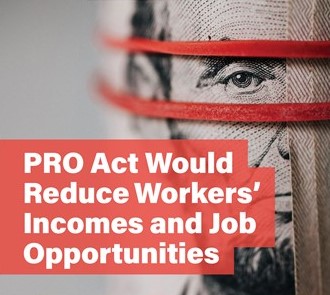Posts tagged personal information
Commentary: Is bill a state-led worker’s board, or a gift to SEIU?
April 7, 2025 // A secret ballot election for unionization requires a certain percentage of the bargaining unit to sign so-called “showing of interest” cards. When an organization allegedly has resorted to forgery is tasked with gathering and submitting these cards, it calls the integrity of the process into question. SB 1138 and HB 3838 present themselves as measures to improve workforce standards for care providers, but they have but one purpose — growing SEIU 503’s membership and influence. By embedding the union into training programs, handing it access to personal contact information and placing itself in workforce oversight, SEIU is positioned to grow its ranks at the expense of worker autonomy.
NEW YORK: With A2593, unions are outsourcing their deceit to robots
March 27, 2025 // A2593, recently introduced in the New York State Assembly, would allow unions to make automated “robocalls” to public employees who’ve opted out of union membership. If the proposal sounds absurd, that’s because it’s a blatant attempt to preserve their fading influence by strongarming workers who have unequivocally expressed their wishes already. The bill claims to protect New Yorkers’ privacy; in reality, it would accomplish the polar opposite by granting government unions one of the few legal exceptions to make robocalls in the state.

Hackers Ransom 500,000 Union Members’ Personal Information
March 23, 2025 // The attack targeted the Pennsylvania State Education Association (PSEA) and impacted more than 500,000 individuals, including public school teachers and support staff. During the breach, hackers accessed individuals’: Date of birth. Social Security numbers. Driver’s license numbers. Passport numbers. Bank account information, including account and routing numbers and passwords. Credit and debit card information, including card numbers, PINs, and card expiration dates. Health insurance and medical information. Why does the PSEA have access to all this information, especially since most have nothing to do with work or union representation? Simply put, unions often obtain personal information to contact employees about political causes and union organizing outside the workplace. They also send unpaid dues to collections.

Marshall mum on Senator Hawley’s Pro-Worker framework
March 11, 2025 // According to Vincent Vernuccio, president of the Institute of the American Worker, the Pro-Worker Framework has been largely lifted straight from the PRO Act. “I mean, now I guess the question is, do you refer to most of these provisions as the PRO Act, or do you refer to them as the Pro Act and the Hawley framework?” Vernuccio said in a phone interview. “Because it looks like Senator (Josh) Hawley from Missouri is copying and pasting a bunch of sections into his new framework.” Vernuccio said only one bill related to this has been introduced so far — the “Faster Labor Contracts Act S.844,” which, among other things, deals with government-imposed contracts by binding arbitration — but the Framework has several other provisions indicating that the concepts are copied and pasted directly from the PRO Act.
Vanderbilt University does not have to turn over graduate students’ private data to union, court rules
December 4, 2024 // “The National Labor Relations Board…often, as part of unionization elections, requires employers to hand over to union officials employees’ private information,” says NRTW Vice President Patrick Semmens. He adds that the NLRB recently “expanded the information to include personal email and cell phones with no way to assure the information isn’t misused or shared with other third parties.” “This happens even if individual workers object and say they do not want their personal information given to union officials, who in many instances have used such information in nefarious and even illegal ways,” Semmens says.

COMMENTARY: You Can’t Support Trump and Government Unions
November 21, 2024 // Trump and his allies have talked endlessly about the need to take on the “deep state” or “drain the swamp” in Washington, D.C. Sometimes such talk veers into conspiracy-theorizing, but it’s certainly true that many federal bureaucrats are opposed to Trump and their obstruction can prevent him from governing as he was elected to govern. For years, conservatives have been raising the alarm about the constitutional problems that an entrenched, unelected administrative state presents when it hinders the elected leaders from making decisions. Government unions stand in the way of making many reforms to the civil service that Trump would like to see.

COMMENTARY: Don’t Let the Teamsters Pick the Labor Secretary
November 20, 2024 // It’s not as though congressional Republicans don’t have an alternative. The Employee Rights Act would protect secret-ballot elections, independent contracting, and franchising and prohibit union intimidation and the collection of personal information, while continuing to allow states to enact right-to-work laws. It has 84 Republican co-sponsors, and the latest two were added within the last week. Yet rather than support that bill that would build on conservative labor-policy successes, Chavez-DeRemer was one of only three Republicans who supported the PRO Act instead.
Citing Federal Student Privacy Law, Vanderbilt Graduate Students Move to Block UAW Union Organizers from Obtaining Their Personal Info
October 27, 2024 // VGWU union bosses are seeking the students’ personal information as part of the union campaign to place Vanderbilt graduate students under UAW union monopoly bargaining control. NLRB Region 10 in Atlanta has issued a subpoena at the union’s behest seeking to force Vanderbilt University to hand over this information to union officials. However, the graduate students argue that the Family Educational Rights and Privacy Act (FERPA) forbids the Vanderbilt administration from disclosing this information to any third parties without their permission, including the UAW.
The Union Members Who Never Voted for Their Union
September 10, 2024 // Reform federal labor law to require a secret-ballot election for unionization, as the Employee Rights Act would do. A 2022 survey showed that 70 percent of Americans — and 76 percent of union households — support this concept. At present, unions can succeed without support from a majority of its workforce when only a tiny portion of eligible employees vote in the election. For example, the NLRB is considering certifying an election in California in which just three employees out of 24 voted to unionize. A fourth voted against the union, and the rest did not vote. Federal labor law should require a quorum — such as two-thirds of all eligible voters — in order for an election result to be upheld. Such a requirement is popular: Eighty-four percent of Americans support this idea.

Government Unions are Down — But Not Out
September 10, 2024 // For nearly a decade, the Commonwealth Foundation has tracked state-by-state changes in labor laws. Every two years, the Commonwealth Foundation releases its research on the ever-changing legal landscape for public sector unions, assessing each state’s efforts to promote public employees’ rights or cave to unions’ entrenched influence. This fourth edition examines government unions’ attempts, following Janus, to hold onto and expand special legal privileges under state laws. The research also highlights the states reining in government unions’ power and influence by empowering workers.
